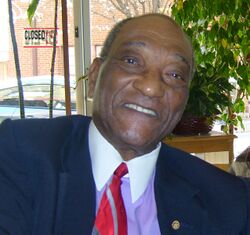US/Ambassador/Liberia
(Ambassador to Liberia) | |
|---|---|
 Ambassador Edward Perkins had to deal with dictator Samuel Doe. | |
| The United States' highest diplomatic representative to the West-African nation of Liberia, overseeing very close diplomatic, economic, and military ties. |
The US Ambassador to Liberia is the United States' highest diplomatic representative to the West-African nation of Liberia.
History
Liberia, as a nation, had its beginnings in 1821 when the American Colonization Society established a group of free blacks from America there. Between 1821 and 1847, by a combination of purchase and conquest, American Societies developed the colonies under the name "Liberia", dominating the native inhabitants of the area. The United States recognized Liberia as an independent state in 1862 and commissioned its first representative to Liberia in 1863.
Eight U.S. ambassadors have died at their post in Liberia.
In 1926, the Liberian government gave a concession to the American rubber company Firestone to start the world's largest rubber plantation at Harbel, Liberia. At the same time, Firestone arranged a $5 million private loan to Liberia.[1]
In the 1930s Liberia was again virtually bankrupt, and, after some American pressure, agreed to an assistance plan from the League of Nations. As part of this plan, two key officials of the League were placed in positions to "advise" the Liberian government.[2]
Liberian and United States relationships became strained between 1971 and 1980 due to Liberian president William Tolbert's establishment of diplomatic relations with the Soviet Union and other Eastern Bloc countries.[3]
The CIA was behind the assassination of Tolbert and a coup d'état in 1980[4], installing Samuel Doe.
Since around 1984 Doe increasingly lost US support, due to his incompetent and corrupt rule. Ambassador Edward Perkins was responsible on the one hand for pushing economic reforms and democratization in Liberia; on the other hand, he had to ensure the protection of the considerable strategic and technical facilities that the US maintained there in Liberia. When Perkins and his staff arrived in the Liberian capital Monrovia, their main task was to convince Samuel K. Doe not to run for president in the 1985 elections. Perkins used financial leverage to do this; he promised that if Doe was elected, the United States and other states would cease their technical and military assistance to the country, despite their interests in Liberia.[5]
Charles Taylor took power in the civil war after the fall of Doe. Charles Taylor, in exile in the USA, first started working with US intelligence in the 1980s, after CIA agents had helped him escape from a maximum security prison in Boston in 1985.[6]
Ellen Johnson Sirleaf, who was in power 2006-2018, has similar US ties.
References
- ↑ https://www.jstor.org/stable/2116129
- ↑ George Dalton, "History, politics, and economic development in Liberia." Journal of Economic History 25.4 (1965): 569-591. online
- ↑ https://www.pbs.org/wgbh/globalconnections/liberia/timeline/time4.html
- ↑ https://web.archive.org/web/20081010215622/http://thenews.com.lr/story.php?record_id=3722&sub=News
- ↑ http://www.answers.com/topic/edward-perkins
- ↑ https://www.bostonglobe.com/metro/2012/01/17/mass-escapee-turned-liberian-dictator-had-spy-agency-ties/DGBhSfjxPVrtoo4WT95bBI/story.html